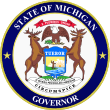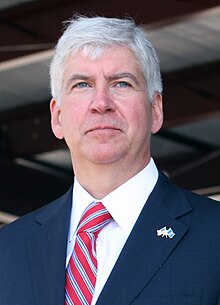Governor of Michigan
| Governor of the State of Michigan | |
|---|---|

|
|

|
|
| Style | His Excellency [1] The Honorable |
| Residence |
Governor's mansions: Lansing Mackinac Island |
| Appointer | Popularly elected |
| Term length | Four years, renewable once |
| Inaugural holder | Stevens T. Mason |
| Formation | January 26, 1837 |
| Website | michigan.gov/gov |
The Governor of Michigan is the chief executive of the U.S. state of Michigan. The current governor is Rick Snyder, a member of the Republican Party, who was inaugurated on January 1, 2011, as the state's 48th governor, was re-elected November 4, 2014, and was sworn in for a second term on January 1, 2015. He is not eligible for a third term under Michigan's term limits, which limit a governor to two, four-year terms.
Governors of Michigan, as well as their lieutenant governors, must be United States citizens who have resided in Michigan for the four years preceding election and must be at least 30 years of age. A constitutional amendment adopted by the voters at the 2010 general election provides that a person is ineligible for any elected office, including governor and lieutenant governor, if convicted of a felony involving dishonesty, deceit, fraud, or a breach of the public trust, and if the conviction were related to the person's official capacity while holding any elective office or position of employment in local, State, or Federal government.
From statehood until the election of 1966, governors were elected to two-year terms. Elections are held in November and the governor assumes office the following January, except in the case of death or resignation. From statehood until 1851, elections were held in odd-numbered years. A new state constitution was drafted in 1850 and took effect in 1851. As part of the process bringing the constitution into effect, there was a single one-year term of governor in 1851. Thereafter elections were held on even years.
The constitution adopted in 1963 changed the governor's term to four years, starting in 1967. Since then, gubernatorial elections have been offset by two years from U.S. Presidential elections (e.g., Presidential elections were in 2008 and 2012, the last gubernatorial election was in 2014 and the next will be in 2018). Gubernatorial elections are held concurrently with state Senate elections. The winner of the gubernatorial election takes office at noon on January 1 of the year following the election.
...
Wikipedia

